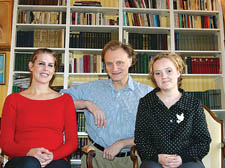|
|
 |
| |

Beryl Bainbridge |
Finding a blessing in the brick that fell in their heads
WHEN it was announced last year that the London Magazine – a bastion of literary society that has enjoyed contributions from Shelley, Keats, Wordsworth and Eliot among others in its 276-year history – would feel the pinch of Arts Council funding cuts, leading arts figures rallied to preserve it.
The protestations fell on deaf ears and the empty coffers forced the resignation of its influential editor, Sebastian Barker.
Yet the publication lives on, continuing to produce its erudite collection of poetry, prose and reviews six times a year from its headquarters in the Chiswick home of the magazine’s mercurial owner, Christopher Arkell.
Arkell, who describes himself as “merely the doorman of an old and stately institution”, attests: “We didn’t appeal because the grounds on which our grant was cut – you don’t sell enough copies and you don’t have enough subscribers – are absolutely true.
“As far as I’m
concerned the artistic merits of the magazine remain as high as ever, so that’s why the magazine will continue. If you live by the grant, you die by the grant.”
Arkell believes the Arts Council decision and the “tremendous outflowing and burst of morale” since the £30,000 annual grant was cancelled have
marked an important change in the
magazine’s direction.
“All blessings come in disguise,” he reasons. “They may come in the disguise of a brick falling on your head, but you will find a blessing in there somewhere.”
A series of three special issues – on Arabic poetry and prose, and the “immense flowering of short stories and poetry” in India and Russia – are being developed.
“There is not enough good literature coming into English from outside sources. The London Magazine, standing with its feet very firmly in London and looking out to the rest of the world, is ideally placed to offer a forum on world literature,” says Arkell.
A new editor will soon be appointed, but for now there is a pared-down crew of five who edit and design the magazine. Acting editor Sara-Mae Tuson is also the editor of Trespass, the “louche, dangerous” cousin of the London Magazine which boasts a younger, hipper readership. At 27, Tuson’s youth stands in stark contrast to the London Magazine’s weighty heritage but this, Arkell hopes, will work to the
publication’s advantage.
He explains: “At the moment, it is a mixture of highbrow and old brow. We don’t want our subscribers to be mentioning their subscription only in their will.”
The latest edition of LM already bears signs of spring-cleaning: spoken word poet Tim Wells sits alongside the classical metered stanzas of William Oxley.
Looking to the future, Arkell and Tuson know they can no longer “rest on the magazine’s reputation”. Advertising and web content, those literary bugbears, will all have to be addressed if they are to catch the fleeting attentions of the modern public.
“If we’re at the forefront of a renaissance I’d be only too happy,” says Arkell. “Otherwise we’re going to be at the rearguard of those people continuing to emphasise that good writing and good reading improve the mind.”
•
There is also a launch party and fundraising auction for the next issue at the Troubadour Club, 263 Old Brompton Road, SW5, on March 10.
www.thelondonmagazine.net
SIMON WROE |

|
 |
|
 |
|

